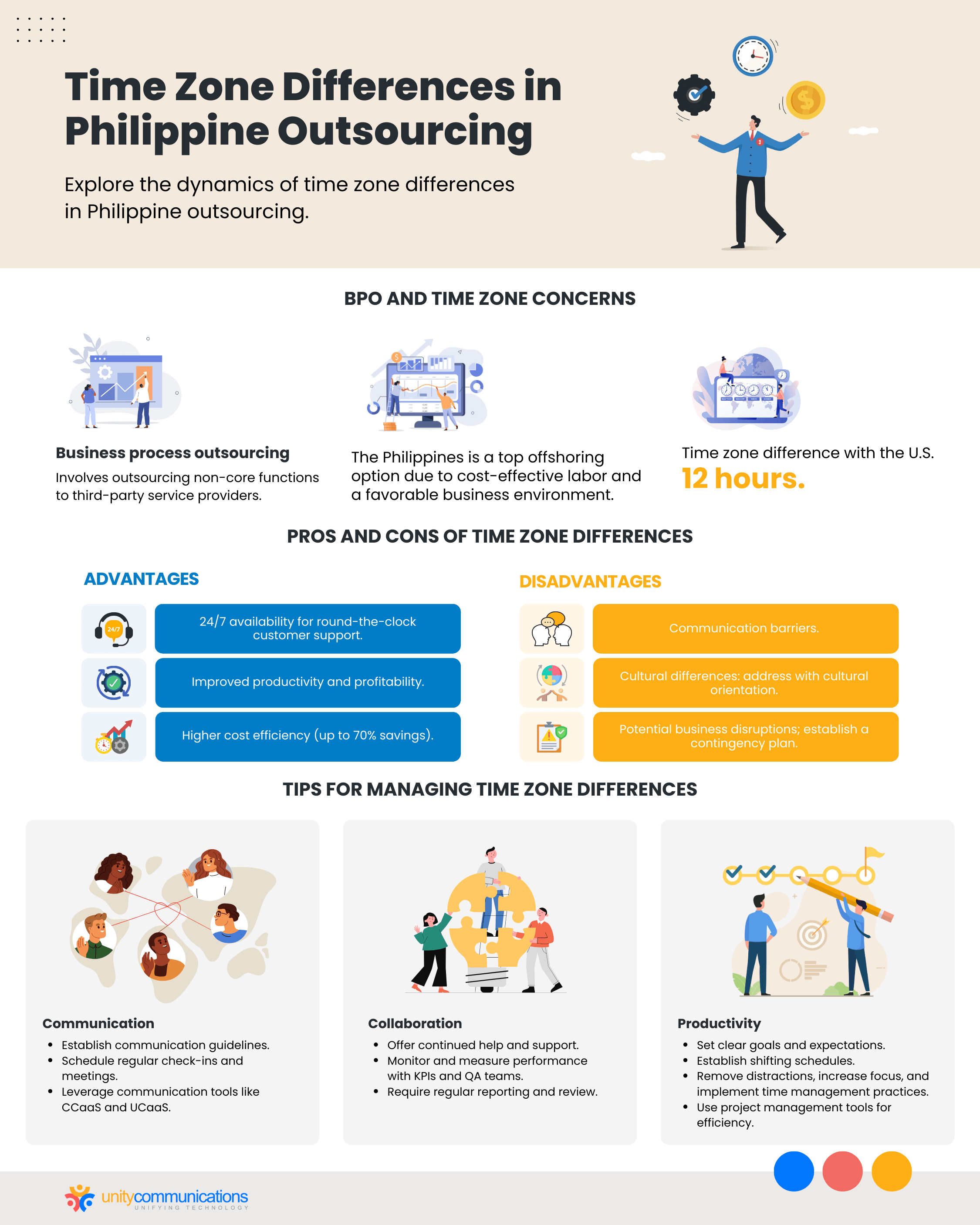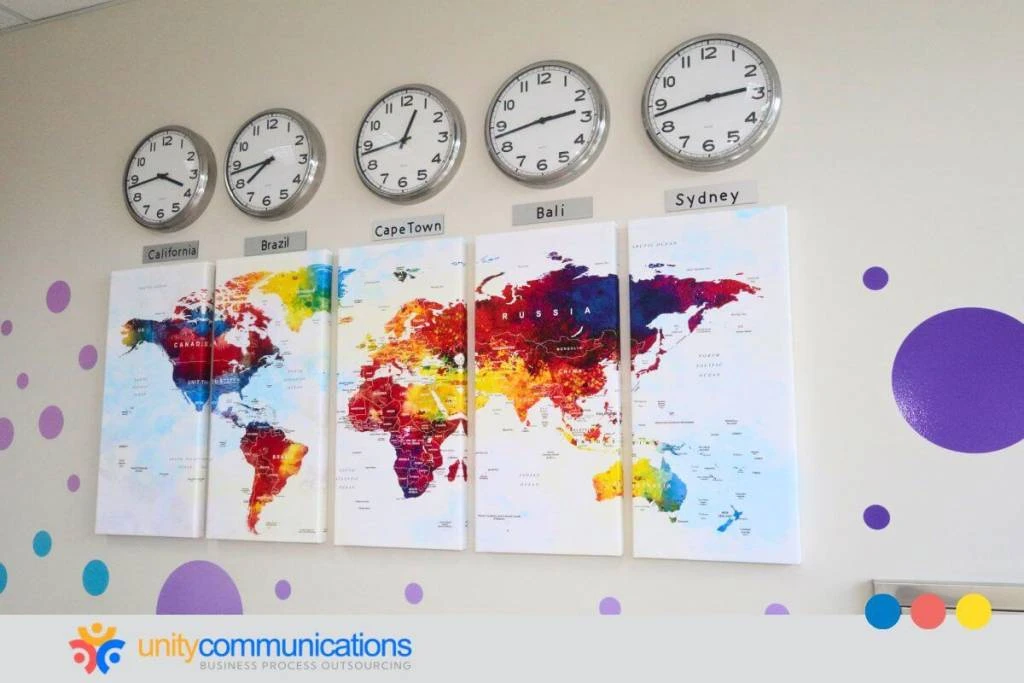Table of Contents
The Philippines is a leading business process outsourcing (BPO) destination. The country has a proven BPO track record, ranking first in voice-related services and comprising 13% of the global market share.
However, companies planning to outsource to the country might be concerned about the significant time zone differences and how they might positively or negatively affect operations.
This page shares some practical tips on managing the time gap and its effects on:
- Communication
- Collaboration
- Productivity
Let us dive right in!
Time Zone Differences: Western Businesses vs. Philippine BPO Companies
Let us start by defining what BPO is. BPO involves contracting processes, usually non-core functions, to third-party service providers. Businesses hire external vendors to handle front-office or back-end tasks.
Most businesses employ offshore outsourcing due to its cost-saving benefits. The Philippines is one of the top offshoring options, known for its cost-effective labor, supportive government, and favorable business environment. The country is also the world’s BPO capital for a reason.
However, time differences are a major concern when outsourcing to the Philippines. Located in Southeast Asia, the country operates on Philippine Standard Time (GMT+8). The Philippines and the U.S. have a 12-hour time difference for the most part.
The significant time zone difference in Philippine outsourcing poses operational challenges such as language barriers, cultural disparities, and operational disruptions. Understanding the time gap is crucial since it directly impacts communication, collaboration, and productivity.
Learn practical tips in the next section for how Western companies can manage differences in time zones when working with BPO companies in the Philippines.
How to Manage Time Zone Differences for Philippine Outsourcing

The Philippine BPO industry has established itself as a leading outsourcing destination globally. Colliers noted that the Philippines could capture a bigger share of the global BPO market.
According to reports, the country’s information technology and business process management (IT-BPM) industry has an increasing market growth rate. This sector could grow from $29.5 billion in 2021 to $59 billion in revenue by 2028.
What do these numbers mean? Businesses, especially those in Western countries, will continue outsourcing to the Philippines despite the time zone differences. Here are a few ways they can maximize Philippine outsourcing and minimize the risks of time gaps:
1. Communication: Opening Lines of Communication
Effective communication is the key to business success. This is especially true for offshore outsourcing, where companies work with BPO providers in distant time zones. Opening lines of communication is vital for a successful outsourcing engagement. Here is how:
- Establish communication guidelines. These protocols should include daily communication and regular auditing, reporting, and reviews. They ensure you are always in touch with your Philippine BPO provider for robust collaboration.
- Schedule regular check-ins and meetings. You and your BPO team should work together toward the same business goals. You want to ensure that both parties are always on the same page.
- Leverage communication tools. Digital tools and technologies pave the way for seamless communication and remove barriers. For instance, capitalize on contact center as a service (CCaaS) for customer interactions and unified communications as a service (UCaaS) for worker collaboration.
2. Collaboration: Building Solid Business Partnerships
Offshore outsourcing entails two companies working together in different countries. Time zone differences can affect the BPO’s engagement, resulting in potential miscommunication, delayed work, and unsuccessful projects. Follow the steps below to establish robust partnerships with your Philippine BPO provider:
- Offer continued help and support. While entrusting your business functions to a BPO partner, continuously assist them in various aspects of the outsourcing operations. These include recruitment, onboarding, training, production, and performance monitoring.
- Monitor and measure performance. Set key performance indicators (KPIs) focusing on critical metrics such as efficiency, quality, and customer satisfaction (CSAT). Establish a quality assurance (QA) team to track BPO agents and audit their work.
- Require regular reporting and review. Meet your BPO team members and have a frank discussion about their performance. The goal is to identify areas for improvement and find ways to address them.
3. Productivity: Delivering More Output
Productivity is a measure of success in offshore outsourcing. When working with a Philippine BPO provider, you want to boost your productivity for business profitability, growth, and success. Time zone differences can contribute to productive output if you work with a BPO partner with 24-hour operations. However, implement the following best practices:
- Set clear goals and expectations. Clearly define objectives on your service-level agreement (SLA).
- Establish shifting schedules. Your BPO provider must consist of teams working on shifting schedules to be more productive and not get burned out.
- Remove distractions and increase focus. To do this, streamline standard operating procedures (SOPs), simplify workflows, declutter working spaces, and provide regular support.
- Implement time management practices. Introduce your BPO team to the Pomodoro Technique, Eisenhower Matrix, 80/20 Rule, and more. These techniques can help your team manage their time effectively.
- Use project management tools. Leverage the latest technologies, such as software automation. These digital tools can reduce manual work and accelerate processes, making your Philippine BPO team more efficient and productive.
The Pros and Cons of Time Zone Differences for Philippine Outsourcing

According to the Outsourcing Journal, the Philippine IT-BPM industry ranks first in voice-related services, comprising 13% of the worldwide BPO market share.
The report shows that Western companies will continue to capitalize on the Philippine outsourcing market. However, differences in time zones can pose challenges to your BPO engagement. Weighing their pros and cons is crucial for making informed outsourcing decisions.
Below are the advantages and disadvantages of time zone differences in Philippine BPO.
Advantages of Time Zone Differences When Outsourcing
Explore the advantages of time zones in outsourcing.
- 24/7 availability. Philippine BPO firms usually operate 24 hours a day, seven days a week. Their teams often work on shifting schedules. Hiring a BPO partner on the other side of the globe ensures round-the-clock customer support.
- Improved productivity. Undisrupted business operations lead to a boost in productivity. The more work hours your BPO teams put in, the more they can produce quality output.
- Increased profitability. High productivity and enhanced customer satisfaction translate to an increase in the bottom line. As time zone differences result in productive hours, a Philippine BPO partner can help boost your profits.
- Higher cost efficiency. Why would you hire a BPO partner with a 12-hour time zone difference? The answer is its cost-saving benefit. Philippine outsourcing can cut your labor expenses by up to 70%.
Disadvantages of Time Zone Differences When Outsourcing
Beware of the disadvantages of time zone differences in Philippine outsourcing.
- Communication barriers. Due to differences in time zones, it might be hard to communicate with BPO team members on the other side of the globe. Establish communication protocols, set regular interactions, and leverage digital tools to address this.
- Cultural differences. Philippine outsourcing with eight to 12-hour time zone gaps also means encountering cultural differences. To bridge these gaps, offer your BPO team cultural orientation and training.
- Business disruptions. Hiring a BPO provider on the other side of the globe sets your organization up for potential disruptions. Prepare for natural calamities, public holidays, and geopolitical events. Better yet, develop and establish a contingency plan.
The Bottom Line

Time zone differences in Philippine outsourcing offer numerous advantages. They provide 24/7 availability, enhanced productivity, high profitability, and cost efficiency. However, they create communication barriers, cultural differences, and business disruptions.
Consider our practical tips for handling time zone differences when outsourcing to the Philippines. With these tips, you can reap the benefits of Philippine BPO brought about by time zones.
Are you ready to outsource to the Philippines despite the time zone differences? Let’s connect! Unity Communications can help streamline your front- and back-office operations and ensure you achieve business growth and success.



